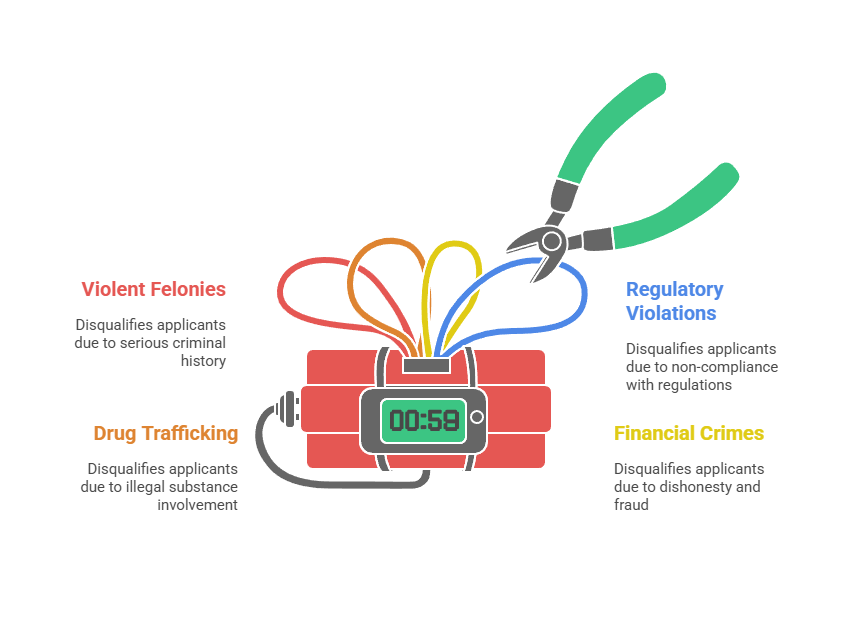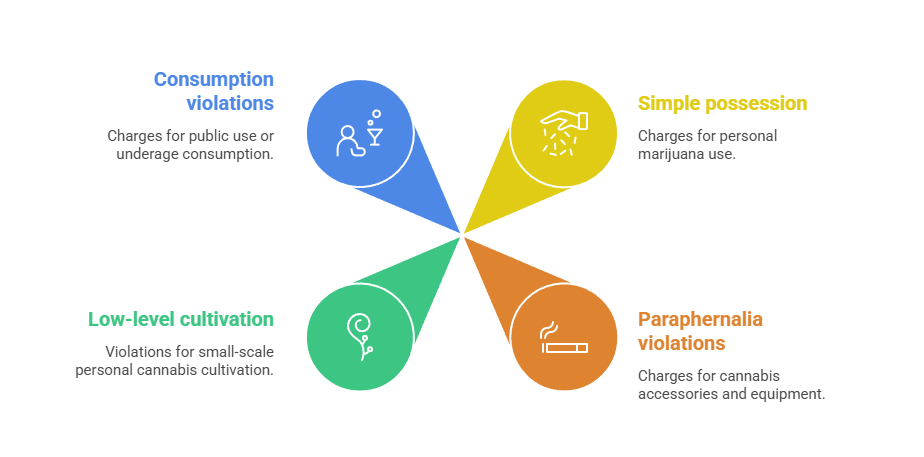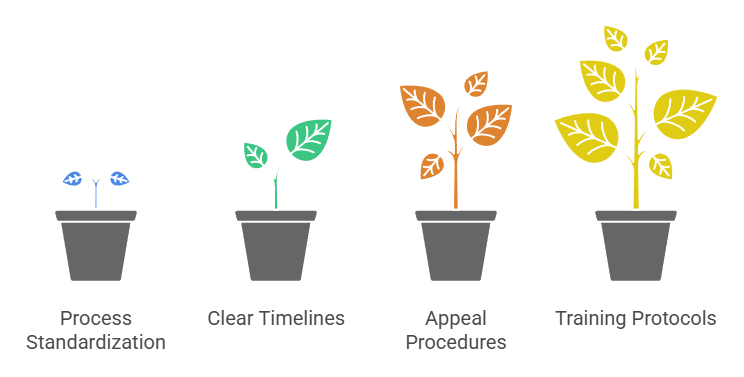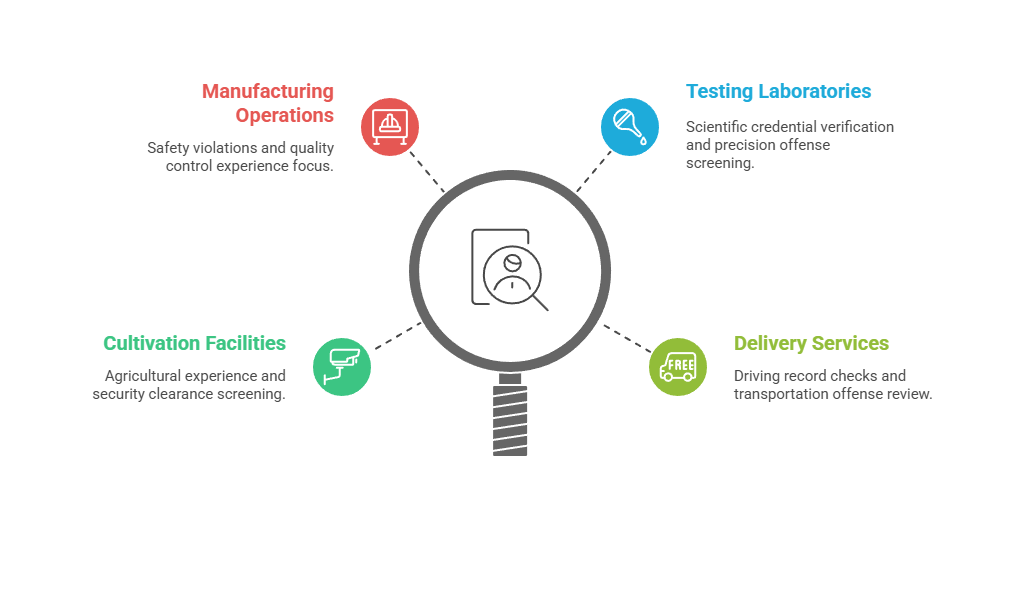Cannabis background check requirements vary significantly across legal states, with some requiring extensive federal and state screenings while others focus primarily on disqualifying criminal offenses. Understanding these state-specific employment screening mandates is crucial for dispensary owners to maintain compliance and avoid costly regulatory penalties.
Key Takeaways:
- Most states require both state and federal background checks for cannabis workers, typically conducted through authorized third-party screening companies
- Disqualifying offenses generally include violent crimes, drug trafficking, and financial crimes, though marijuana-related convictions are often excluded
- Background check costs range from $50-200 per employee, with renewal requirements varying from annual to every three years depending on the state
- Processing times typically span 2-8 weeks, requiring employers to plan hiring timelines accordingly to avoid operational delays
- Some states like California and Illinois have implemented social equity provisions that may waive certain background check requirements for qualifying applicants
- Non-compliance with background check requirements can result in fines ranging from $1,000 to $50,000 plus potential license suspension or revocation
Understanding Cannabis Industry Background Check Fundamentals
The cannabis industry operates under strict regulatory frameworks that mandate comprehensive employee screening processes. Cannabis background check requirements serve as a critical compliance mechanism. They ensure that individuals working in licensed facilities meet state-imposed standards for public safety and regulatory integrity.
These employment screening protocols typically examine criminal history, financial background, and regulatory compliance records. The screening process helps state regulators maintain oversight of the industry. Additionally, it protects consumers and communities from potential risks. Most jurisdictions require background checks for all cannabis workers, from budtenders to executives. However, specific requirements vary considerably between states.
Understanding these requirements is essential for dispensary owners and hiring managers. They must navigate complex regulations to avoid compliance violations. The complexity of state-specific regulations means that multi-state operators face additional challenges. These businesses must understand different screening standards, timelines, and disqualifying criteria across their various locations. Proper planning and knowledge help ensure smooth operations and regulatory compliance.
Federal vs. State Background Check Components
Cannabis employment screening typically involves both federal and state-level investigations. Federal background checks examine FBI criminal databases, providing a comprehensive view of an applicant's nationwide criminal history. State checks focus on local court records and regulatory databases within specific jurisdictions.
The dual-layer approach ensures thorough vetting but can complicate the screening timeline. Federal checks often take longer to process, particularly when applicants have lived in multiple states. Complex criminal histories requiring additional verification can further extend processing times.
State-by-State Cannabis Background Check Requirements
California Cannabis Employment Screening
California requires comprehensive background checks for all cannabis license holders and their employees through the Department of Cannabis Control. The state mandates both state and federal criminal history checks. Processing typically takes 4-6 weeks to complete under normal circumstances.
- Violent felonies: Convictions within the past seven years for assault, robbery, or domestic violence
- Drug trafficking: Non-cannabis drug sales or distribution convictions within five years
- Financial crimes: Fraud, embezzlement, or tax evasion convictions within the past decade
- Regulatory violations: Previous cannabis license revocations or serious compliance violations
California's social equity programs may provide exemptions for certain marijuana-related convictions. These programs particularly benefit individuals from communities disproportionately impacted by cannabis prohibition. Background check fees range from $75-150 per employee, with renewals required every three years.
Colorado Cannabis Worker Background Checks
Colorado's Marijuana Enforcement Division requires state and federal background checks for all key personnel and support staff. The state utilizes a tiered approach with different screening levels. These levels are based on job responsibilities and access to cannabis products.
| Personnel Type | Background Check Level | Processing Time | Cost |
| Key Personnel | Comprehensive Federal/State | 6-8 weeks | $165 |
| Support Staff | State Criminal History | 2-3 weeks | $75 |
Colorado excludes most marijuana-related convictions from disqualifying criteria. However, the state maintains strict standards for violent crimes and drug trafficking offenses. The state requires annual background check renewals for key personnel and biennial renewals for support staff.
Washington State Cannabis Background Requirements
Washington's Liquor and Cannabis Board mandates comprehensive screening for all cannabis workers. This includes fingerprint-based FBI checks and state criminal history reviews. The process also includes both criminal background investigation and financial interest disclosure requirements.
The state maintains a detailed list of disqualifying offenses. These include any felony conviction within ten years or misdemeanor drug convictions within three years. However, simple marijuana possession convictions are generally excluded from disqualifying criteria. This reflects the state's progressive approach to cannabis policy reform.
Oregon Cannabis Employment Screening Standards
Oregon requires background checks through the Oregon Liquor Control Commission. The state focuses on criminal history and regulatory compliance records. Oregon emphasizes rehabilitation and second chances for individuals with certain criminal convictions. The state allows these individuals to seek exemptions through a formal petition process.
Processing times average 3-4 weeks with costs of approximately $85 per applicant. Oregon requires background check renewals every two years. Expedited processing is available for urgent hiring needs at additional cost.
Nevada Cannabis Worker Screening Protocols
Nevada's Cannabis Compliance Board requires comprehensive background investigations for all cannabis establishment agents. The screening process includes criminal history checks, financial background reviews, and verification of previous employment. Additionally, the state examines employment in regulated industries to ensure compliance standards.
- Fingerprint submission: Digital fingerprinting through authorized vendors only
- Financial disclosure: Tax compliance verification and comprehensive debt analysis
- Character references: Professional references from non-cannabis industry contacts required
- Residency verification: Nevada residency requirements apply for certain positions within facilities
Nevada's background check process typically takes 4-6 weeks to complete. Fees range from $100-175 depending on the position level and responsibilities. The state requires annual renewals for all cannabis worker registrations.
Illinois Cannabis Employment Screening
Illinois requires background checks through the Illinois Department of Financial and Professional Regulation. The state emphasizes social equity considerations in its screening process. Illinois maintains specific provisions for individuals from communities disproportionately impacted by cannabis prohibition.
The state requires comprehensive criminal history checks and financial background investigations. Processing times typically range from 3-5 weeks with fees of $150-200 per applicant. Illinois allows conditional licensing for social equity applicants while background checks are pending.
Massachusetts Cannabis Background Check Standards
Massachusetts implements tiered screening requirements based on ownership percentage and operational responsibilities. The Cannabis Control Commission requires all agents to undergo state and federal background checks. The process includes extensive financial background investigations for ownership positions.
| Position Level | Ownership Threshold | Background Check Requirements | Cost |
| Agent | 0% | State criminal history | $50 |
| Key Employee | 0-5% | State and federal checks | $125 |
| Executive/Owner | 5%+ | Comprehensive financial screening | $200 |
Massachusetts excludes certain marijuana-related convictions but maintains strict standards for financial crimes. The state requires background check renewals every two years for all cannabis workers.
Regional Variations in Cannabis Background Check Standards
East Coast states generally implement more stringent background check requirements compared to West Coast pioneers. States like New York and New Jersey require extensive financial background investigations alongside criminal history reviews. These requirements reflect more cautious regulatory approaches to cannabis legalization. The enhanced scrutiny often extends processing times and increases compliance costs for businesses.
- New York: Comprehensive 10-year criminal history review with financial background investigation
- New Jersey: State and federal checks with specific focus on organized crime connections
- Connecticut: Enhanced screening for individuals with prior regulatory violations
- Pennsylvania: Strict disqualifying criteria with limited exemption processes available
Southern states entering cannabis legalization tend to adopt conservative screening approaches. Texas medical cannabis programs maintain strict disqualifying criteria with limited exemption processes. States like Virginia implement more moderate standards focused on public safety concerns. However, these standards still exceed many western state requirements. The conservative approach reflects regional attitudes toward criminal justice and cannabis policy.
Midwestern states show varied approaches to cannabis background screening requirements. Illinois emphasizes social equity considerations in background check requirements and processing. Ohio maintains traditional strict screening protocols similar to eastern states. Michigan follows a moderate approach balancing public safety with rehabilitation recognition. These regional differences reflect broader cultural and political attitudes toward cannabis legalization.
Processing Timelines Across Jurisdictions
Background check processing times vary significantly across states due to multiple factors. These factors include regulatory capacity, database integration, and application volumes throughout the year. Understanding these timelines is crucial for workforce planning and operational continuity. Businesses must plan hiring schedules around these processing periods to avoid disruptions.
| Processing Speed | States | Average Timeline | Key Factors |
| Fast (2-3 weeks) | Oregon, Colorado | 14-21 days | Streamlined digital processes |
| Standard (4-6 weeks) | California, Nevada, Illinois | 28-42 days | Manual review components |
| Slow (6-8 weeks) | New York, New Jersey, Massachusetts | 42-56 days | Complex financial screening |
Expedited processing options are available in some states for additional fees. However, these typically only reduce timelines by 7-10 days maximum. Planning hiring timelines around these processing periods helps avoid operational disruptions and ensures compliance deadlines are met.
Cost Analysis of Cannabis Employment Screening
Cannabis background check costs represent a significant operational expense for dispensaries and cultivation facilities. Understanding the full cost structure helps businesses budget appropriately. Additionally, it allows them to factor screening expenses into hiring decisions and operational planning. These costs vary considerably across states and position levels within organizations.
- Application fees: $50-200 per employee depending on state requirements and position level
- Fingerprinting services: $15-35 per applicant through authorized vendors only
- Renewal fees: Annual or biennial charges ranging from $40-150 per employee
- Expedited processing: Additional $25-75 for faster turnaround times when available
Indirect costs also impact overall screening expenses for cannabis businesses. Administrative time includes HR staff hours for application management and follow-up activities. Training delays result from extended onboarding timelines that affect productivity and revenue generation. Rejection rates create costs associated with screening multiple candidates for single positions.
Multi-state operators face compounded costs when employees work across jurisdictions. Some states require separate background checks for each location or license type. However, others offer reciprocity agreements that reduce duplicate screening expenses. Understanding these requirements helps businesses optimize their screening strategies and control costs.
Return on Investment Considerations
While cannabis background checks represent significant upfront costs, they provide substantial value through regulatory compliance and risk mitigation. Proper screening reduces the likelihood of costly compliance violations and criminal activity. Additionally, it minimizes operational disruptions that can impact revenue and business reputation.
The investment in thorough background screening also enhances business credibility with regulators and financial institutions. Clean compliance records facilitate easier license renewals and expansion approvals. Furthermore, they improve access to banking services in the heavily regulated cannabis industry.
Common Background Check Disqualifiers in Cannabis Industry
Cannabis industry background checks focus on specific categories of criminal offenses and regulatory violations. States consider these factors incompatible with cannabis work due to public safety concerns. Understanding these disqualifying factors helps employers and job seekers navigate the screening process more effectively. Additionally, it allows for better planning and preparation during the application process.

- Violent felonies: Assault, robbery, homicide, and domestic violence convictions typically disqualify applicants across all states
- Drug trafficking: Non-cannabis drug sales, manufacturing, or distribution offenses within specified timeframes
- Financial crimes: Fraud, embezzlement, money laundering, and tax evasion convictions
- Regulatory violations: Previous cannabis license suspensions, revocations, or serious compliance violations
Time-based restrictions vary significantly across different offense categories and jurisdictions. Recent felonies typically carry 5-10 year lookback periods for serious felony convictions. Misdemeanor offenses generally have 3-5 year restrictions for drug-related misdemeanors and theft offenses. Financial violations often include extended 10-15 year restrictions for fraud and white-collar crimes.
The severity and recency of offenses significantly influence disqualification decisions across all jurisdictions. States increasingly recognize rehabilitation efforts and may consider various factors when evaluating borderline cases. These factors include community service completion, treatment program participation, and stable employment history. However, the evaluation process varies considerably between states and regulatory agencies.
Marijuana-Related Conviction Exemptions
Most cannabis states exclude marijuana-related convictions from disqualifying criteria for employment screening. This approach recognizes the contradiction of penalizing individuals for activities now legal and regulated. This progressive policy supports criminal justice reform efforts nationwide. Additionally, it acknowledges the disproportionate impact of cannabis prohibition on certain communities.

- Simple possession: Personal use marijuana possession charges from any time period
- Paraphernalia violations: Cannabis accessory and equipment charges
- Low-level cultivation: Small-scale personal cultivation violations and related offenses
- Consumption violations: Public use or underage consumption charges
However, serious marijuana trafficking convictions may still disqualify applicants in some jurisdictions. This particularly applies to cases involving large quantities, sales to minors, or organized criminal activity. States differentiate between personal use violations and commercial drug trafficking when evaluating cannabis-related criminal histories. The distinction helps maintain public safety while supporting rehabilitation and second chances.
Appeal and Exemption Processes
Many states provide formal processes for individuals to appeal background check disqualifications or seek exemptions. These processes recognize rehabilitation efforts and changing circumstances since conviction dates. The appeal process typically requires documentation of rehabilitation efforts and character references. Additionally, applicants may need to demonstrate community involvement and stable employment history.
The appeal process varies significantly across states in terms of requirements and timelines. Some states have streamlined digital submission processes that take 2-3 weeks to review. Others require in-person hearings or extensive documentation that can extend the process for months. Understanding these options helps applicants prepare appropriately and improve their chances of success.
Compliance Best Practices for Cannabis Employers
Effective cannabis background check compliance requires systematic processes and clear documentation throughout the hiring process. Additionally, it demands ongoing monitoring of regulatory changes that may impact screening requirements. Successful dispensaries implement comprehensive screening protocols that exceed minimum requirements while supporting fair hiring practices. These protocols help protect businesses from compliance violations and operational risks.
Documentation requirements form the foundation of effective compliance programs for cannabis businesses. Application tracking involves detailed records of all background check submissions and results. Decision rationales require written explanations for hiring decisions, particularly rejections based on criminal history. Renewal scheduling includes systematic tracking of background check expiration dates and renewal requirements.

- Process standardization: Consistent application of uniform screening standards to all positions and candidates
- Clear timelines: Established deadlines for background check completion and hiring decisions
- Appeal procedures: Formal processes for candidates to dispute results or seek exemptions
- Training protocols: Regular staff training on screening requirements and compliance obligations
Regular compliance audits help identify potential issues before they become regulatory violations. Working with experienced cannabis attorneys and compliance consultants ensures screening programs meet evolving regulatory standards. Additionally, it helps businesses maintain industry best practices and avoid costly mistakes.
Third-Party Screening Vendor Selection
Choosing qualified background check providers is crucial for cannabis businesses operating in regulated markets. Regulatory agencies often require specific screening protocols and reporting formats from authorized vendors. Authorized vendors must maintain appropriate licensing, security standards, and regulatory approval in each jurisdiction. Additionally, they must demonstrate experience working with cannabis industry clients and requirements.
Vendor evaluation requires careful consideration of multiple factors that impact service quality and compliance. Regulatory approval involves valid authorization to conduct cannabis industry background checks in relevant states. Security standards include FCRA compliance and data protection protocols meeting cannabis industry requirements. Processing capabilities must include adequate capacity to handle volume requirements within regulatory timelines.
| Evaluation Criteria | Requirements | Impact on Operations |
| Regulatory Approval | State authorization for cannabis screening | Compliance protection |
| Processing Speed | Meet regulatory timelines | Hiring efficiency |
| Technology Integration | API connectivity and automation | Administrative efficiency |
Establishing relationships with multiple approved vendors provides backup options during high-volume periods. Additionally, it ensures continuity if primary vendors experience processing delays or service interruptions. This redundancy helps maintain consistent hiring operations and compliance standards.
Documentation and Record Keeping Requirements
Proper documentation and record keeping are essential components of cannabis background check compliance programs. States typically require employers to maintain detailed records of all screening activities and decisions. These records must be readily available for regulatory inspections and audits. Additionally, they must be stored securely to protect applicant privacy and sensitive information.
Record retention requirements vary by state but typically range from 3-7 years for background check documentation. Electronic storage systems must include appropriate security measures and backup procedures. Paper records require secure storage with restricted access and climate control considerations. Proper organization and indexing facilitate quick retrieval during regulatory inspections.
Industry-Specific Background Check Considerations

Different segments within the cannabis industry may face varying background check requirements and considerations. Cultivation facilities often have different security concerns compared to retail dispensaries or manufacturing operations. Additionally, positions involving direct patient interaction in medical cannabis programs may require enhanced screening. Understanding these nuances helps businesses develop appropriate screening protocols for their specific operations.
Retail dispensaries typically focus on customer-facing positions that require strong communication skills and trustworthiness. Background checks for these positions emphasize theft-related offenses and customer safety concerns. Security personnel face enhanced screening requirements due to their access to cannabis products and facilities. Management positions often require the most comprehensive screening due to their operational authority and regulatory responsibilities.

- Cultivation facilities: Enhanced screening for agricultural experience and security clearances
- Manufacturing operations: Focus on safety violations and quality control experience
- Testing laboratories: Scientific credential verification and precision-related offense screening
- Delivery services: Driving record checks and transportation-related offense review
Medical cannabis programs often implement more stringent background check requirements compared to adult-use markets. These programs emphasize patient safety and medical professionalism in their screening protocols. Additionally, they may require healthcare-related background checks or professional licensing verification. The enhanced requirements reflect the medical nature of these programs and their vulnerable patient populations.
Position-Specific Screening Requirements
Different positions within cannabis operations may require tailored background check approaches based on responsibilities and access levels. Entry-level positions like budtenders typically require standard criminal history checks and basic qualification verification. Management positions often demand comprehensive screening including financial background investigations and professional reference verification.
Security personnel face the most stringent background check requirements due to their critical role in facility protection. These positions typically require enhanced criminal history screening, professional security experience verification, and ongoing monitoring requirements. Additionally, security personnel may need specialized licensing that requires separate background investigations.
| Position Level | Screening Requirements | Special Considerations |
| Entry-Level | Standard criminal history | Customer interaction focus |
| Management | Comprehensive screening | Financial responsibility |
| Security | Enhanced investigation | Ongoing monitoring |
Executive positions and ownership roles require the most extensive background investigations across all cannabis markets. These investigations typically include comprehensive financial screening, regulatory compliance history, and professional reference verification. Additionally, executives may face ongoing monitoring and annual re-screening requirements to maintain their positions.
Conclusion
Cannabis background check requirements represent a complex regulatory landscape that varies significantly across legal jurisdictions. Successful compliance requires understanding state-specific screening protocols, disqualifying criteria, and processing timelines that directly impact hiring operations. As the industry matures, background check requirements continue evolving toward more equitable approaches that balance public safety concerns with social justice considerations and rehabilitation recognition. Dispensary owners and hiring managers must stay current with regulatory changes while implementing systematic compliance processes that protect their operations and support fair employment practices.
Frequently Asked Questions
How long do cannabis background checks typically take to process?
Cannabis background checks usually take 2-8 weeks to complete, depending on the state and complexity of the applicant's history. States with streamlined digital processes like Oregon and Colorado average 2-3 weeks, while jurisdictions requiring extensive manual review like New York may take 6-8 weeks. Expedited processing is available in some states for additional fees.
What criminal convictions automatically disqualify someone from cannabis employment?
Violent felonies, drug trafficking (non-cannabis), financial crimes like fraud or embezzlement, and previous cannabis license violations typically disqualify applicants. However, most states exclude simple marijuana possession and related cannabis convictions from disqualifying criteria. The timeframe for disqualification varies, with violent crimes often carrying 7-10 year restrictions.
Can someone with a criminal record work in a cannabis dispensary?
Yes, individuals with certain criminal records can work in cannabis, depending on the nature, severity, and timing of offenses. Many states focus on rehabilitation and exclude marijuana-related convictions from disqualifying criteria. Some jurisdictions offer formal appeal processes for individuals seeking exemptions from standard disqualification rules.
How much do cannabis background checks cost employers?
Cannabis background check costs range from $50-200 per employee, plus additional fees for fingerprinting ($15-35) and potential renewal charges every 1-3 years. Multi-state operators may face higher costs if employees work across jurisdictions requiring separate screenings. Expedited processing typically adds $25-75 to standard fees.
Are cannabis background checks required for all dispensary employees?
Most states require background checks for all cannabis workers, including budtenders, security personnel, managers, and ownership. Some jurisdictions use tiered approaches with different screening levels based on job responsibilities and access to cannabis products. Very few positions in licensed cannabis facilities are exempt from background check requirements.
What happens if an employee's background check expires?
Expired background checks can result in immediate work suspension until renewals are completed, as most states prohibit unlicensed individuals from working in cannabis facilities. Employers should implement systematic tracking of expiration dates and begin renewal processes 60-90 days before deadlines to avoid operational disruptions and potential compliance violations.
Additional Resources
- Cannabis Industry Background Check Compliance Guide 2025
https://www.cannabiscompliance.org/background-checks - State Cannabis Regulatory Agency Directory
https://www.cannabisregulators.org/state-agencies - FCRA Compliance for Cannabis Employers
https://www.ftc.gov/business-guidance/resources/fair-credit-reporting-act - Cannabis Employment Law Updates
https://www.cannabisemploymentlaw.com/resources - National Cannabis Industry Association Hiring Guidelines
https://www.thecannabisindustry.org/employment-resources - Cannabis Background Check Vendor Directory
https://www.cannabisscreening.org/approved-vendors

GCheck Editorial Team
Meet the GCheck Editorial Team, your trusted source for insightful and up-to-date information in the world of employment background checks. Committed to delivering the latest trends, best practices, and industry insights, our team is dedicated to keeping you informed.
With a passion for ensuring accuracy, compliance, and efficiency in background screening, we are your go-to experts in the field. Stay tuned for our comprehensive articles, guides, and analysis, designed to empower businesses and individuals with the knowledge they need to make informed decisions.
At GCheck, we're here to guide you through the complexities of background checks, every step of the way.





